Surasan: Difference between revisions
mNo edit summary |
|||
| (4 intermediate revisions by one other user not shown) | |||
| Line 23: | Line 23: | ||
| parent = | | parent = | ||
| website = Surasan.th.com | | website = Surasan.th.com | ||
}}'''Surasan Co., Ltd.''' is a Ther multinational video game company headquartered in [[Sattabhaya]]. It develops, publishes and releases both video games and video game consoles. | }}'''Surasan Co., Ltd.''' is a [[Thervala|Ther]] multinational video game company headquartered in [[Sattabhaya]]. It develops, publishes and releases both video games and video game consoles. | ||
Surasan was founded 1982 by computer hobbyist Niran Thaworn and has produced a variety of video game franchises, consoles, and home Personal Computers ever since. Seeing the success of video games internationally, Thaworn was inspired to make video games that were more palatable to Ther standards. These dreams came to fruition when some investments made in the late 1970s left Thaworn with a fortune which he used to start and fund Surasan. | Surasan was founded 1982 by computer hobbyist Niran Thaworn and has produced a variety of video game franchises, consoles, and home Personal Computers ever since. Seeing the success of video games internationally, Thaworn was inspired to make video games that were more palatable to Ther standards. These dreams came to fruition when some investments made in the late 1970s left Thaworn with a fortune which he used to start and fund Surasan. | ||
| Line 32: | Line 32: | ||
=== Founding and The Chaocon === | === Founding and The Chaocon === | ||
In the late 1970s and early 1980s, Thervala, much like the rest of the world was flooded with low quality video games and video game consoles. This displeased Sattabhaya native Niran Thaworn greatly, due to his love of the medium and for the burgeoning computer industry. Due to a handful of investments that were suggested by a friend, Thaworn saw a large return of his money. He decided that with this new found wealth he would corner Thervala's video game market with high quality products. | In the late 1970s and early 1980s, Thervala, much like the rest of the world was flooded with low quality video games and video game consoles. This displeased Sattabhaya native Niran Thaworn greatly, due to his love of the medium and for the burgeoning computer industry. Due to a handful of investments that were suggested by a friend, Thaworn saw a large return of his money. He decided that with this new found wealth he would corner Thervala's video game market with high quality products. [[File:Chaocon.webp|thumb|"Surasan Sensation!", a magazine that was packed with every Chaocon unit]]Thaworn and a handful of his friends from Sattabhaya Computer College pooled together all of their money to register the company in Sattabhaya in 1982. They chose the name 'Surasan' - a Ther title denoting a heavenly warrior. They created their first office in the Thaworn family's garage. This is where they started development on Surasan's inaugural product, the [[Chaocon]]. The Chaocon would be a low cost 8-bit home computer that would be accessible to both families and enthusiasts. The Chaocon would also feature videogames packed onto cartridges as opposed to the floppy disks that were widely used at the time. Thaworn conceptually envisioned a system that was not only accessible in price, but in usage. There would be no need to install any kind of software to use the Chaocon, it would just need to be plugged into a television to be played. | ||
Thaworn and his team were split into two groups during the development of the Chaocon, one was dedicated to hardware and the other was dedicated to the creation of games. Although the game development team came up with a variety of games that would later become beloved franchises of Surasan, the main game that was being developed for the Chaocon was Starman. The original Starman title was a platformer so that it would be simple enough to run on an 8-bit system while still looking as good as video arcade games. Shortly after Starman ended its development, The Noble Spirit also finished development. The Noble Spirit was a'''.''' top down RPG inspired by Burgoignac and Ther folktales and took considerably more effort to create for an 8-bit system. The Chaocon itself was developed in tandem with its two launch titles, and in December of 1982 it was ready to hit the market. | |||
Thaworn and a handful of his friends from Sattabhaya Computer College pooled together all of their money to register the company in Sattabhaya in 1982. They chose the name 'Surasan' - a Ther title denoting a heavenly warrior. They created their first office in the Thaworn family's garage. This is where they started development on Surasan's inaugural product, the [[Chaocon]]. The Chaocon would be a low cost 8-bit home computer that would be accessible to both families and enthusiasts. The Chaocon would also feature videogames packed onto cartridges as opposed to the floppy disks that were widely used at the time. Thaworn conceptually envisioned a system that was not only accessible in price, but in usage. There would be no need to install any kind of software to use the Chaocon, it would just need to be plugged into a television to be played. | |||
Thaworn and his team were split into two groups during the development of the Chaocon, one was dedicated to hardware and the other was dedicated to the creation of games. Although the game development team came up with a variety of games that would later become beloved franchises of Surasan, the main game that was being developed for the Chaocon was Starman. The original Starman title was a platformer so that it would be simple enough to run on an 8-bit system while still looking as good as video arcade games. Shortly after Starman ended its development, The Noble Spirit also finished development. The Noble Spirit was a top down RPG inspired by Burgoignac and Ther folktales and took considerably more effort to create for an 8-bit system. The Chaocon itself was developed in tandem with its two launch titles, and in December of 1982 it was ready to hit the market. | |||
The Chaocon was a major success domestically and abroad, selling 60 million units worldwide. The Chaocon was particularly popular in [[Oyashima]] and [[Burgundie]]. Due to its commercial success, Surasan was able to hire a much larger base of programmers and computer engineers to diversify and extend the small catalogue of games. Thaworn and his core team also began work on concepts for accessories for the Chaocon. Namely, the Chaocon received a Light Pistol, Light Shotgun, and the Chaoglove. | The Chaocon was a major success domestically and abroad, selling 60 million units worldwide. The Chaocon was particularly popular in [[Oyashima]] and [[Burgundie]]. Due to its commercial success, Surasan was able to hire a much larger base of programmers and computer engineers to diversify and extend the small catalogue of games. Thaworn and his core team also began work on concepts for accessories for the Chaocon. Namely, the Chaocon received a Light Pistol, Light Shotgun, and the Chaoglove. | ||
=== Chaocon Accessories === | === Chaocon Accessories === | ||
[[File:0003012192023 4096x.webp|thumb|The Chaobuss]] | |||
Thaworn foresaw potential stagnation with the limited capacity of the Chaocon due to it only running on a data width of eight bits. Due to this foresight, he assigned his most senior staff to what was known as "Project Gold". Project gold was the title for the design and production of the Chaocon's main line of accessories. Six accessories were planned for the Chaocon, but only three ever made it to the production stage. This was mainly due to the amount of money it would cost to produce the more elaborate accessories planned for the Chaocon. These were going to be a mat that sensed feet movement for sports and dance games, a card reader for a potential trading card game, and a Chaovision which would be used to make the Chaocon semi-portable. | Thaworn foresaw potential stagnation with the limited capacity of the Chaocon due to it only running on a data width of eight bits. Due to this foresight, he assigned his most senior staff to what was known as "Project Gold". Project gold was the title for the design and production of the Chaocon's main line of accessories. Six accessories were planned for the Chaocon, but only three ever made it to the production stage. This was mainly due to the amount of money it would cost to produce the more elaborate accessories planned for the Chaocon. These were going to be a mat that sensed feet movement for sports and dance games, a card reader for a potential trading card game, and a Chaovision which would be used to make the Chaocon semi-portable. | ||
[[File:Chaoglove.webp|thumb|left|A prototype of the infamous Chaoglove]] | |||
While there were many third party accessories that saw great success on the market, Surasan only officially produced and licensed three products. The '''Chaoglove''' was a glove with a small computer built onto the wrist. It was meant to be hooked up to the Chaocon and used ultrasonic sensors to provide a quasi-VR gaming experience. The product saw a spike in negative reviews due to Surasan not producing a left handed variant of the glove. This was particularly a problem in the [[Occidental world|Occident]] where left handedness is more accepted. In [[Thervala]] there is a strong sense of folklore and mysticism, left handedness is seen as the mark of an unholy person and left handedness is usually taught out of a child at a very young age. Thaworn personally made a statement against the complaints received by the company saying that he would not [sic] 'produce something that would be used by a spiritually unclean person'. Despite the heavy backlash from this comment, Surasan has infamously never issued refunds for Chaogloves or apologized for Niran Thaworn's statement. | |||
[[File:Chaocannon.jpg|thumb|The Chaogun]] | |||
Surasan's other two accessories were much more successful than the Chaoglove. They were the '''Chaogun''' and the '''Chaobuss'''. Both of these were developed for a demand in Thervala for more military oriented video games. The Chaocon had found an unlikely demographic in the [[Royal Military of Thervala]]. Alleged reports of video games helping Ther veterans of [[Operation Kipling]] cope with their PTSD caused demand for more adult oriented Surasan products to skyrocket. In response, Surasan developed a handful of video games which would go on to be great successes when Surasan expanded into arcade cabinets. These games would be [[Kipling Defenders]], [[WKPD]], and [[Red Terror]]. Bundled along with Kipling Defenders was the Chaobuss, a plastic blunderbuss meant to kill on screen insurgents. For WKPD (an abbreviation for Wat Khram Police Department) and Red Terror, a plastic revolver was included. The addition of the mock firearms drew more criticisms from Occidental parents, so more child friendly light guns had to be developed. Contemporary collectors refer to these as the Chaoblaster and the Chaosoaker instead. | |||
=== Rivalry with Voralex === | |||
During Surasan's initial bout of success in 1985 a competitor company entered the video gaming market. This company was [[Voralex]]. Voralex was a reputed Ther toy company that had been around for a over a hundred years at the time. They had successfully poached a handful of Surasan's core team and developed a direct competitor to the Chaocon, that was the [[Nexar]]. While the Nexar was initially projected to outpace the Chaocon due to its slightly more advanced hardware, it ultimately never got the market appeal it needed. With Voralex now on the market, Surasan no longer existed in a vacuum. This kicked off a video game arms race known as the [[Console Wars]]. Projects for a new system started being developed by both companies as the 1980's came to a head. | |||
==== The Super Chaocon ==== | |||
Voralex continued to threaten Surasan's position as the hegemonic producer of video games and the Chaocon started to show its age with the rapid advancement of technology. Voralex, due to its revenue from other products, was able to quickly release the [[Pulsar]], a console with a 16 bit data width that was able to deliver arcade-level quality games to households across the world. Voralex also started to put more money into aggressive marketing as not to repeat its previous mistake with the Nexar. Around this time, most households in Thervala possessed a TV. So a large amount of Voralex's money went into funding television ads promoting the Pulsar while also putting Surasan down. Voralex's infamous slogan at the time was "Pulsar's out of this world, Chaocon isn't even out of town" in reference to the Chaocon's aging hardware. | |||
In response, the [[Super Chaocon]] was developed. Surasan's success with the Super Chaocon can largely be attributed simply to Surasan's already developed market presence. By the time the Pulsar had hit the shelves, Voralex had only successfully franchised one video game series. Surasan on the other hand had successfully franchised three and had given its top performing staff free reign over individual passion projects. | |||
[[Category:IXWB]] | |||
[[Category:Thervala]] | |||
[[Category:Companies]] | |||
Latest revision as of 14:25, 23 October 2024
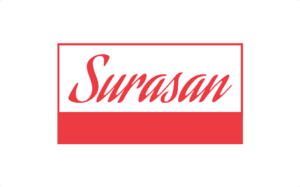 Surasan Logo | |
| Industry |
|
|---|---|
| Founded | July 20, 1982 in Sattabhaya, Thervala |
| Founder | Niran Thaworn |
| Headquarters | , |
| Products | List of products |
| Website | Surasan.th.com |
Surasan Co., Ltd. is a Ther multinational video game company headquartered in Sattabhaya. It develops, publishes and releases both video games and video game consoles.
Surasan was founded 1982 by computer hobbyist Niran Thaworn and has produced a variety of video game franchises, consoles, and home Personal Computers ever since. Seeing the success of video games internationally, Thaworn was inspired to make video games that were more palatable to Ther standards. These dreams came to fruition when some investments made in the late 1970s left Thaworn with a fortune which he used to start and fund Surasan.
Surasan has produced some of the most successful consoles in the video game industry, such as the Chaocon, the Super Chaocon, the Chaocube, and the Surasan XP. Alongside Surasan's consoles, it has released a plethora of franchises developed in house for its game systems. Most notably it has Myanga Warriors, Starman, The Noble Spirit, and Creature Town.
History
Founding and The Chaocon
In the late 1970s and early 1980s, Thervala, much like the rest of the world was flooded with low quality video games and video game consoles. This displeased Sattabhaya native Niran Thaworn greatly, due to his love of the medium and for the burgeoning computer industry. Due to a handful of investments that were suggested by a friend, Thaworn saw a large return of his money. He decided that with this new found wealth he would corner Thervala's video game market with high quality products.
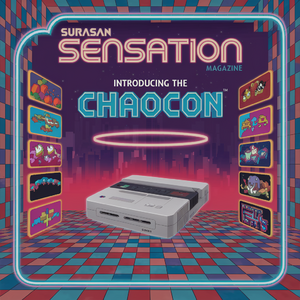
Thaworn and a handful of his friends from Sattabhaya Computer College pooled together all of their money to register the company in Sattabhaya in 1982. They chose the name 'Surasan' - a Ther title denoting a heavenly warrior. They created their first office in the Thaworn family's garage. This is where they started development on Surasan's inaugural product, the Chaocon. The Chaocon would be a low cost 8-bit home computer that would be accessible to both families and enthusiasts. The Chaocon would also feature videogames packed onto cartridges as opposed to the floppy disks that were widely used at the time. Thaworn conceptually envisioned a system that was not only accessible in price, but in usage. There would be no need to install any kind of software to use the Chaocon, it would just need to be plugged into a television to be played.
Thaworn and his team were split into two groups during the development of the Chaocon, one was dedicated to hardware and the other was dedicated to the creation of games. Although the game development team came up with a variety of games that would later become beloved franchises of Surasan, the main game that was being developed for the Chaocon was Starman. The original Starman title was a platformer so that it would be simple enough to run on an 8-bit system while still looking as good as video arcade games. Shortly after Starman ended its development, The Noble Spirit also finished development. The Noble Spirit was a. top down RPG inspired by Burgoignac and Ther folktales and took considerably more effort to create for an 8-bit system. The Chaocon itself was developed in tandem with its two launch titles, and in December of 1982 it was ready to hit the market.
The Chaocon was a major success domestically and abroad, selling 60 million units worldwide. The Chaocon was particularly popular in Oyashima and Burgundie. Due to its commercial success, Surasan was able to hire a much larger base of programmers and computer engineers to diversify and extend the small catalogue of games. Thaworn and his core team also began work on concepts for accessories for the Chaocon. Namely, the Chaocon received a Light Pistol, Light Shotgun, and the Chaoglove.
Chaocon Accessories
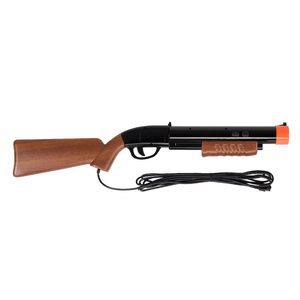
Thaworn foresaw potential stagnation with the limited capacity of the Chaocon due to it only running on a data width of eight bits. Due to this foresight, he assigned his most senior staff to what was known as "Project Gold". Project gold was the title for the design and production of the Chaocon's main line of accessories. Six accessories were planned for the Chaocon, but only three ever made it to the production stage. This was mainly due to the amount of money it would cost to produce the more elaborate accessories planned for the Chaocon. These were going to be a mat that sensed feet movement for sports and dance games, a card reader for a potential trading card game, and a Chaovision which would be used to make the Chaocon semi-portable.
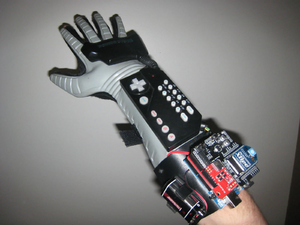
While there were many third party accessories that saw great success on the market, Surasan only officially produced and licensed three products. The Chaoglove was a glove with a small computer built onto the wrist. It was meant to be hooked up to the Chaocon and used ultrasonic sensors to provide a quasi-VR gaming experience. The product saw a spike in negative reviews due to Surasan not producing a left handed variant of the glove. This was particularly a problem in the Occident where left handedness is more accepted. In Thervala there is a strong sense of folklore and mysticism, left handedness is seen as the mark of an unholy person and left handedness is usually taught out of a child at a very young age. Thaworn personally made a statement against the complaints received by the company saying that he would not [sic] 'produce something that would be used by a spiritually unclean person'. Despite the heavy backlash from this comment, Surasan has infamously never issued refunds for Chaogloves or apologized for Niran Thaworn's statement.
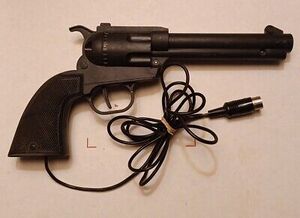
Surasan's other two accessories were much more successful than the Chaoglove. They were the Chaogun and the Chaobuss. Both of these were developed for a demand in Thervala for more military oriented video games. The Chaocon had found an unlikely demographic in the Royal Military of Thervala. Alleged reports of video games helping Ther veterans of Operation Kipling cope with their PTSD caused demand for more adult oriented Surasan products to skyrocket. In response, Surasan developed a handful of video games which would go on to be great successes when Surasan expanded into arcade cabinets. These games would be Kipling Defenders, WKPD, and Red Terror. Bundled along with Kipling Defenders was the Chaobuss, a plastic blunderbuss meant to kill on screen insurgents. For WKPD (an abbreviation for Wat Khram Police Department) and Red Terror, a plastic revolver was included. The addition of the mock firearms drew more criticisms from Occidental parents, so more child friendly light guns had to be developed. Contemporary collectors refer to these as the Chaoblaster and the Chaosoaker instead.
Rivalry with Voralex
During Surasan's initial bout of success in 1985 a competitor company entered the video gaming market. This company was Voralex. Voralex was a reputed Ther toy company that had been around for a over a hundred years at the time. They had successfully poached a handful of Surasan's core team and developed a direct competitor to the Chaocon, that was the Nexar. While the Nexar was initially projected to outpace the Chaocon due to its slightly more advanced hardware, it ultimately never got the market appeal it needed. With Voralex now on the market, Surasan no longer existed in a vacuum. This kicked off a video game arms race known as the Console Wars. Projects for a new system started being developed by both companies as the 1980's came to a head.
The Super Chaocon
Voralex continued to threaten Surasan's position as the hegemonic producer of video games and the Chaocon started to show its age with the rapid advancement of technology. Voralex, due to its revenue from other products, was able to quickly release the Pulsar, a console with a 16 bit data width that was able to deliver arcade-level quality games to households across the world. Voralex also started to put more money into aggressive marketing as not to repeat its previous mistake with the Nexar. Around this time, most households in Thervala possessed a TV. So a large amount of Voralex's money went into funding television ads promoting the Pulsar while also putting Surasan down. Voralex's infamous slogan at the time was "Pulsar's out of this world, Chaocon isn't even out of town" in reference to the Chaocon's aging hardware.
In response, the Super Chaocon was developed. Surasan's success with the Super Chaocon can largely be attributed simply to Surasan's already developed market presence. By the time the Pulsar had hit the shelves, Voralex had only successfully franchised one video game series. Surasan on the other hand had successfully franchised three and had given its top performing staff free reign over individual passion projects.